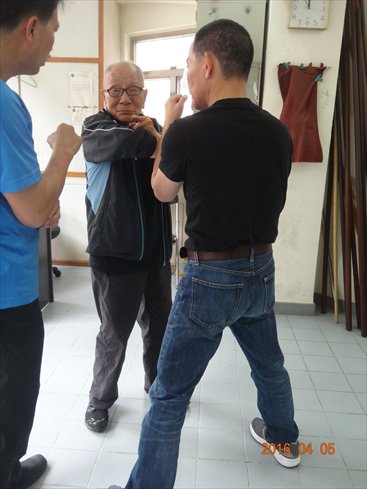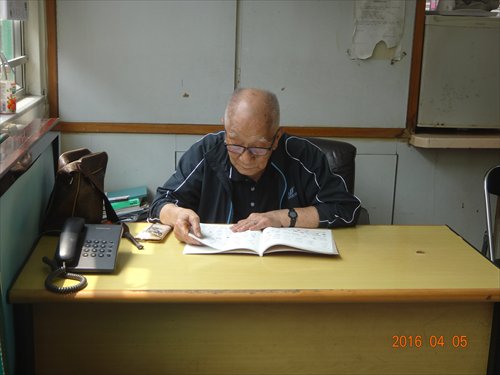Ip Man’s son on the future of the Wing Chun school

Wing Chun Master Ip Chun teaches students at his studio in Hong Kong. Photo: Wei Xi/GT

Wing Chun Master Ip Photo: Wei Xi/GT
With the popularity of the Ip Man franchise and The Grandmaster, Wing Chun kung fu master Ip Man has become a household name in China, as well as a representative figure of Chinese martial arts. Although he too followed in his father's footsteps to become a martial arts master in his own right, Ip Chun, Ip Man's eldest son, has lived a relatively quiter life. To someone who didn't know his lineage, Ip Chun looks just like an ordinary elderly man you might encounter on the street.
The 92-year-old runs the Ving Tsung (Wing Chun) Athletic Association in Hong Kong. The day I met with him, I had an image of a low-profile celebrity in mind, so I was surprised by his simple and unadorned style: The collar of his black polo T-shirt was so worn out that it had begun to tear, and the watch on his wrist was so out of fashion I thought it was a woman's watch.
Just like Ip, the room where he and his fellow Wing Chun masters teach was simple. The few adornments in the 20-square-meter or so room consisted of a black and white portrait and a busted sculpture of Ip Man and several plaques upon which the rules of the school were written. Ip Chun's "office" - a table, a chair and a telephone - was in a corner.
My first impression stepping into the world of martial arts was very different from what I was used to seeing in films and TV dramas and even different from the gyms that teach Chinese martial arts or Korean Taekwondo in the Chinese mainland. Ip told me later that their tuition fee of HK $500 ($64.45) a month has been the same for decades, while similar martial arts classes usually cost around 150 yuan ($23.07) per class (an hour) in cities in the mainland.
Son of a kung fu master, Ip Chun, however, did not fully devote himself to passing on Wing Chun until he reached retirement age.
"I did not have the chance to learn Wing Chun in the early days when I was studying on the mainland and my father was in Hong Kong," Ip told me, adding that even after he arrived in Hong Kong later on he was occupied with other professions.
"At the start teaching kung fu was just a way to make a living as my son was still a child. Since my father was still there, it was easier for me to teach others with his guidance."
Yet, as Ip became accustomed to his role as an instructor, he realized that he had a certain responsibility, "I realized I had to teach my students and disciples well, and therefore I had to first learn it well myself."
At an age when most people spend their days resting, Ip not only teaches Wing Chun at the association but also all across Hong Kong and the mainland. When asked if he had ever considered taking a break from teaching, Ip said, "I will continue to work until I can no longer move.
"There is no such thing as 'retirement' in the teaching of martial arts. Just like a line in The Grandmaster, 'As long as I have breath, I will shine a light.'"
A weekday morning, most of the students present were middle-age or elderly men. Ip said that there tends to be more young people and children in the evenings and during weekends.
Wing Chun's global standing
Tennis teacher Charlie Hoang was one of the students present that day. Hoang moved to Hong Kong from the US six years ago and has been practicing Wing Chun for the last two months. Having learnt Taekwondo before, Hoang was attracted by Wing Chun because the martial art isn't about power.
"You don't have to be physically strong. Everyone can do it," he said.
Taking time to visit the school during his vacation in Hong Kong, Tristan Charpentier said he had been studying Wing Chun back in France for sometime already. Introduced to it by a friend, Charpentier fell in love with this Chinese martial arts the first time he tried it.
"This is where the very famous masters are," Charpentier told me. "[I want] to meet people to see the differences."
Charpentier also pointed out that Judo and Tawkwondo are still more influential than Chinese martial arts in France because the latter two have formal competitions in the Olympics, which helps their popularity. However, he added that Wing Chun has stood out from other Chinese martial arts in recent years because of the films about Ip Man.
Q&A with Ip Chun
Q: Wing Chun has been rising in popularity in recent years. How much do you attribute this to films like the Ip Man franchise? What role do you think films and TV dramas should play when it comes to popularizing traditional culture that is often ignored?
A: Media plays an import role in the popularity of kung fu. In China, there was an increased number of people that began studying martial arts after the films came out. However, a number of them did not stick with it and left awhile later.
But I still have a positive opinion on the ability of films and TV dramas to promote traditional culture. Therefore every time a new work is about to come out, I will be glad to take part in the production, such as providing materials or being a consultant. I have even acted in one or two of them as well.
Q: Martial arts is a signature of Chinese culture. However, it does not seem to have the same popularity overseas compared with South Korea's Taekwondo or Japan's Judo. What do you think the reason is?
A: As far as I know, both Judo and Taekwondo receive government support. But Chinese kung fu's development has normally relied on the practicers and masters. There is little in the way of support from the government.
I do not agree that Taekwondo and Judo have developed better than Chinese kung fu. These years, Chinese kung fu has seen increasing influence overseas, which sometimes even surpasses that of Judo and Taekwondo.
Q: You have expressed opposition to the commercialization of Wing Chun. Do you think practicing martial arts and pursuing economic returns are two opposing directions?
A: I am not actually opposed to commercialism, but it negatively impacts the teaching of kung fu if overdone. Nowadays the teaching of kung fu is often treated like a business. Take one example, when I was in the US teaching Wing Chun years ago, I found what the Americans were doing was very commercial. It was as if they purchased a service after paying the tuition fee. After teaching, the master and disciples behaved as if they didn't know each other.
There was no emotional connection between them. I don't think this is good.
Q: How can learning Wing Chun benefit our modern lives?
A: Wing chun is a kind of kung fu that uses soft power to subdue hard power. So you need to always stay in a relaxed state when you practice. This state allows you to learn how to keep an easy attitude even when facing pressure at work.
Newspaper headline: The spirit of martial arts